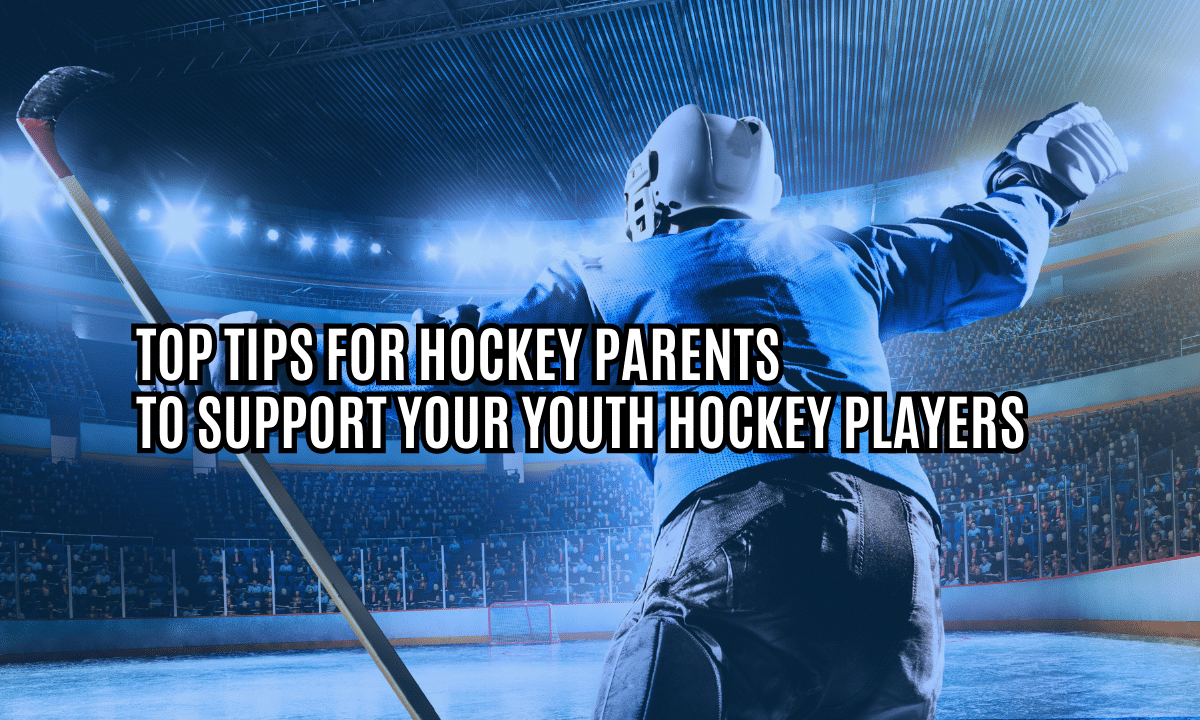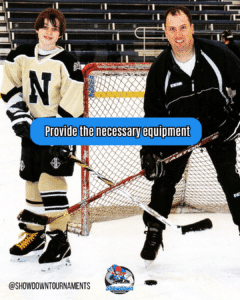As a hockey parent, your role in nurturing and guiding your hockey player’s journey through the world of hockey is invaluable. Youth hockey not only fosters physical development but also teaches crucial life skills: teamwork, discipline, and perseverance. In this guide, we’ll explore essential strategies to help you provide the best possible support to your budding hockey stars. From building the love of the game to cultivating a positive and supportive environment, these tips will empower you to become an effective and encouraging hockey parent. So, lace up your skates, grab your stick, and let’s skate into the world of youth hockey parenting!
Parents play a critical role in supporting their youth hockey players both on and off the ice. Here are some ways that parents can be supportive of their young athletes:
Encourage and support their love of the game: One of the best things parents can do for your hockey players is to encourage their love of the game.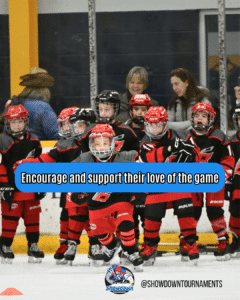
-
Attend games and practices – Family schedules can be quite busy, so talk with your player about when they can and will see you at the games and practices. We recommend not trying to interact with your player while practice or games are going on. You want their full attention to be on the ice, not looking to you for approval.
-
Cheer them on – If their head is fully in the game, they may not be able to hear you and that’s ok. Let the cheering be respectful and cheer for the whole team, not just your kid.
-
Celebrate their successes and support shortfalls – Let your player know you saw something great that your hockey player did. It doesn’t have to be big, it could be as easy as “way to go”, “looks like your coach motivated you”, “great pass” or “great stick work”. It may be more of a challenge to support your player when they mess up or make a mistake. The best advice we have is to ask your kid how the game or practice went and pick up cues from here. Most kids know they made a mistake or are trying to improve, or are having fun playing the game. The goal is to support their developing skills and love of the game.
Provide the necessary equipment: Hockey is a sport that requires specific equipment to play safely. Make sure your child has all the necessary gear, and that it is in good condition and fits properly.
-
When there’s a need for higher-quality gear, you will know. You don’t have to start out with top-of-the-line from head to toe. Many hockey clubs have gear swaps to help with the cost of hockey equipment. Good, well-fitted skates and properly fitted equipment are the essentials. If you are unsure, ask the coach or your local skate shop for guidance.
-
Regular skate sharpening is important too. Not sure how often to have your player’s skates sharpened, ask the skate shop.
-
Have your player check their hockey bag to be sure all the hockey gear is in the bag before leaving the house and the locker room.
Help them manage their time: Youth hockey players often have a lot on their plate, including schoolwork, practices, games, and tournaments. Help your child manage their time by creating a schedule that allows them to balance their responsibilities.
A family calendar and a schedule your kid can use are great ways to get organized and plan ahead. Nobody loves a school project that waited until the last hours late on a Sunday night after a weekend of hockey.
-
Create a Structured Schedule: Work with your child to design a well-organized weekly schedule that balances school, hockey practices, games, homework, and other commitments. Display this schedule visibly, whether on a physical calendar or a digital platform, to keep both you and your child on track. Allocate specific time blocks for various tasks, ensuring to include breaks and leisure time. With a clear plan in place, your child will develop strong time management skills and a heightened
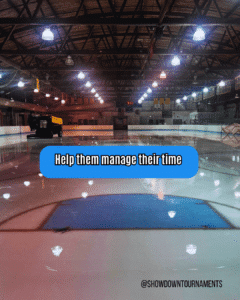 sense of responsibility.
sense of responsibility. -
Prioritize and Set Goals: Sit down together to outline short-term and long-term goals, both within the realm of hockey and other aspects of their life, such as academics. Help them understand the importance of prioritizing tasks based on these goals. For instance, if they have a crucial game approaching, they might need to adjust their study routine to ensure adequate preparation. Guiding them to differentiate between urgent and important tasks will aid in effectively allocating their time.
-
Teach Time-Blocking and Avoid Multitasking: Introduce your child to the concept of time-blocking, a method where they designate specific time slots for focused activities like schoolwork, hockey practice, relaxation, and more. Encourage them to fully immerse themselves in each task without distractions or multitasking. For instance, during study hours, they should concentrate solely on their assignments without veering into unrelated activities. This practice not only boosts productivity but also helps them accomplish tasks with efficiency.
Balancing school and hockey requires thoughtful planning and adherence to a structured routine. While it’s crucial to provide guidance, it’s equally important to allow your child some autonomy in managing their schedule. This empowers them to develop indispensable time management skills that will serve them well not only in their hockey pursuits but also in every facet of their future endeavors.
Provide emotional support: Hockey can be a challenging and emotional sport. Support your child by being there for them when they need to talk or need a listening ear.
-
Open Communication and Active Listening: Foster an environment where your child feels comfortable discussing their feelings and experiences related to hockey. Initiate open conversations about their successes, challenges, and concerns. Actively listen without judgment, giving them your full attention and validation. By creating this space for them to share, you’re offering a valuable outlet for them to express themselves and feel understood.
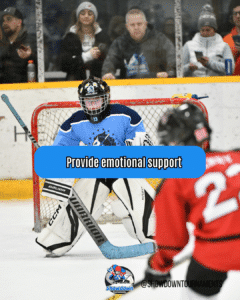
-
Empathize with Their Emotions: Hockey can bring about a range of emotions, from excitement and joy to frustration and disappointment. Acknowledge and empathize with your child’s feelings, letting them know that it’s okay to experience a variety of emotions. Share stories from your own life where you’ve faced challenges or setbacks and how you managed to overcome them. This shared experience can strengthen the bond between you and your child.
-
Offer Encouragement and Positive Reinforcement: Celebrate your child’s successes, no matter how small, and remind them of their progress and growth. Offer words of encouragement and remind them that their effort and dedication are what truly matter. Be their biggest cheerleader both on and off the ice, boosting their confidence and reminding them of their value beyond their performance in hockey.
Incorporating these approaches into your parenting style can help your child navigate the emotional aspects of their hockey journey with confidence and resilience. Your unwavering support as a listening ear and a source of empathy will contribute significantly to their overall well-being and their ability to thrive both in sports and in life.
Encourage healthy habits: Encourage your child to eat a healthy diet, get enough rest, and stay hydrated. These habits can help them perform at their best on the ice.
fostering healthy habits is crucial for your child’s performance and well-being as a hockey player. Here are three ways parents can encourage healthy habits for their young athletes:
-
Promote a Nutritious Food: Educate your child about the importance of balanced nutrition for their energy levels and overall health. Provide a variety of whole foods, including lean proteins, complex carbohydrates, fruits, vegetables, and healthy fats. Emphasize the benefits of fueling their body with nutrient-rich foods that can enhance their stamina, focus, and recovery. Engage them in meal planning and preparation, allowing them to make healthier choices and understand the connection between their diet and their performance on the ice.
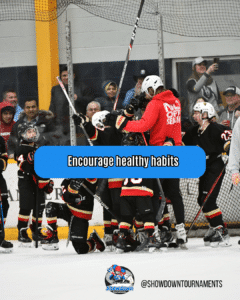
Looking for tips on healthy eating for your player… We highly recommend Stephanie Rock of Rock Performance. She has so many great tips for building healthy kids and athletes.
-
Prioritize Adequate Rest: Sleep is a cornerstone of athletic performance and recovery. Help your child establish a consistent sleep schedule that allows for the recommended amount of sleep for their age. Quality sleep promotes muscle recovery, mental alertness, and overall well-being. Minimize late-night activities and screen time close to bedtime to ensure they’re getting the rest they need to excel on and off the ice.
-
Emphasize Hydration: Staying properly hydrated is essential for maintaining peak physical performance. Encourage your child to drink water regularly throughout the day, not just during practices and games. Explain the importance of hydration in preventing fatigue, muscle cramps, and overheating. Provide a reusable water bottle and make sure they have access to water wherever they go, whether it’s to school, practice, or games.
By instilling these healthy habits in your child’s routine, you’re setting the foundation for their success as a hockey player. Through proper nutrition, adequate rest, and consistent hydration, they’ll be better equipped to perform at their best on the ice, recover effectively, and develop a healthy approach to their well-being that extends beyond the rink.
Be a positive role model: Being a positive role model is paramount for shaping your child’s behavior and values, both in and outside of the hockey arena. Here are three ways hockey parents can set a positive example for their young athletes:
-
Exhibit Sportsmanship: Demonstrate good sportsmanship by showing respect for opponents, teammates, coaches, and officials. Emphasize the importance of playing fairly and treating others with kindness and respect. When your child witnesses you displaying sportsmanship, they’re more likely to internalize these values and carry them onto the ice and into their interactions with others.
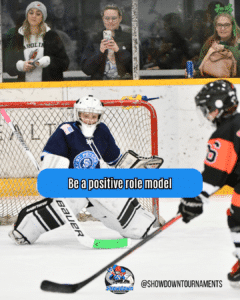
For more ways to exemplify good sportsmanship, we recommend checking out this awesome USA Hockey article.
-
Highlight Teamwork: Emphasize the significance of teamwork and collaboration in both sports and life. Showcase how to work harmoniously with others, whether it’s by volunteering in your community, collaborating with colleagues at work, or supporting your child’s teammates. When your child sees you valuing teamwork, they’ll understand the power of collective effort and camaraderie.
-
Cultivate a Positive Attitude: Maintain a positive and optimistic outlook, even in the face of challenges. Show resilience by acknowledging setbacks and disappointments while focusing on opportunities for growth and improvement. Encourage your child to approach challenges with determination and a positive mindset, fostering their mental toughness and adaptability.
By embodying these qualities and behaviors, you’re not only nurturing your child’s development as a hockey player but also as a responsible and well-rounded individual. Your actions speak volumes, serving as a blueprint for how they should conduct themselves both on and off the ice. Through your positive role modeling, you’re equipping them with valuable life skills that will benefit them far beyond their hockey career.
Respect the coach, opponents, and officials: Respect the coach, opponents, and officials, even if you don’t always agree with their decisions. Follow your Parent Code of Conduct and refer your hockey player to their Player Code of Conduct. Remember that your child’s coaches and officials are there to help your child improve and have a positive experience. Don’t let the actions of others jade your position of respect.
Demonstrating respect for coaches, opponents, and officials is crucial in creating a positive environment in the youth hockey community. Here are three ways to exemplify this respect:
-
Practice Active Listening: When interacting with the coach, opponents, or officials, engage in active listening. Give them your full attention, allowing them to express their viewpoints without interruption. By demonstrating that you value their input, you’re creating an atmosphere of open communication and mutual understanding.
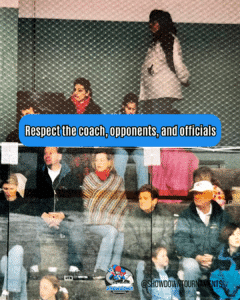
It’s best to not interact with the coaches, opponents or referees unless you are saying good game.
-
Embrace Constructive Communication: If you have concerns or questions, address them with a respectful and constructive approach. Choose your words carefully and avoid using confrontational language. Express your thoughts in a way that encourages dialogue rather than confrontation, keeping the best interests of the players and the game in mind.
-
Model Sportsmanship: Whether in victory or defeat, encourage your child to display sportsmanship towards their team, opponents and the officials. Applaud their efforts and show appreciation for a well-played game, regardless of the outcome. By demonstrating a gracious attitude, you’re teaching your child the value of respect and fair play, setting an example they can emulate.
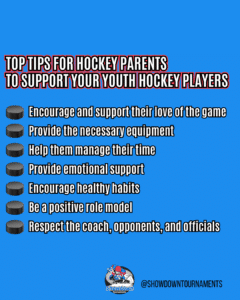
Utimately, respect contributes to a positive atmosphere benefitting everyone involved in youth hockey. Your behavior serves as a guide for your child, teaching them the importance of empathy, effective communication, and sportsmanship. This not only enhances their
hockey experience but also shapes their character in a way that extends well beyond the rink.
The role of parents in supporting their youth hockey players cannot be overstated. Your involvement and encouragement play a crucial role in shaping their experiences both on and off the ice. By nurturing their love for the game, providing the necessary equipment, and helping them manage their time effectively, you’re paving the way for their success. Emotionally, your unwavering support serves as a foundation for their resilience in the face of challenges. As you champion healthy habits and set a positive example through your own behavior, you’re teaching them valuable life lessons that extend far beyond the rink.
So, as you lace up their skates and cheer from the sidelines, know that your dedication is a driving force in their journey. Your guidance molds them into not only skilled hockey players but also confident and well-rounded individuals. By following these tips, you’re ensuring that their time in youth hockey is marked by growth, joy, and meaningful memories that will last a lifetime.
We hope you have an awesome hockey season! We know these tips will get you off on the right skate!
Looking for more youth hockey tips, follow us on Social Media. We share hockey experiences and tips daily. Being hockey parents ourselves, being a youth hockey coach, and with 30 years of experience organizing youth hockey tournaments, we are the go-to for youth hockey.

